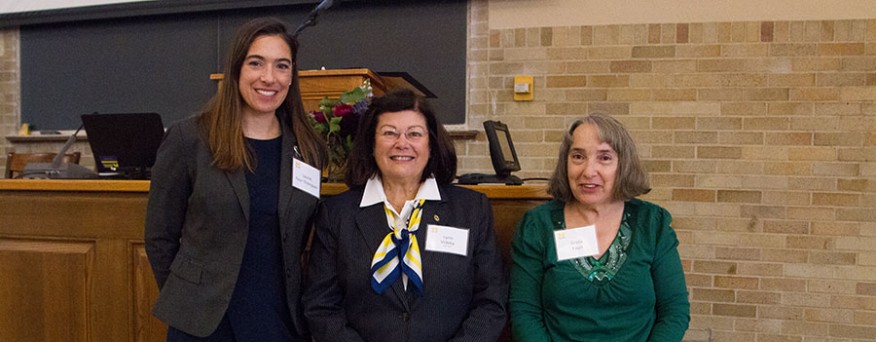The School of Social Work held the 2017 Fedele F. Fauri and Iris M. Fauri Memorial Conference, Raise the Age, on September 29, at Hutchins Hall at the University of Michigan School of Law. The day-long conference, held in collaboration with U-M School of Education, addressed the issue of raising the age at which Michigan youth may be incarcerated in adult facilities.
The Fauri Memorial Conference, held annually, honors former Dean Fedele Fauri’s leadership and his accomplishments in child welfare. The 2017 conference presented several Social Work faculty and guests. The day began with a welcome from the Dean of the School of Social Work, Lynn Videka, who traced her predecessor’s history as the first dean of the School of Social Work and subsequently the University’s Vice President for State Relations and Planning. Fauri also served as Social Security advisor to the United States Senate and to the House Committees on Finance and Ways and Means.
Fauri was dedicated throughout his life to the issues of child welfare at the state and national levels. Thus it was fitting that this year’s Conference centered on a particularly fraught issue: the incarceration of minors in adult prison facilities.
Over the past decade, all but five states have passed laws to raise the age of jurisdiction to 18 years of age, the lone exceptions being Georgia, Michigan, Missouri, Texas, and Wisconsin. According to the Justice Policy Institute, by raising the age, states were able to effectively keep young people safe, enhance public safety, and responsibly manage taxpayer dollars.
Evidence indicates that youth incarcerated in an adult facility are the group most at risk of sexual assault. Sheriffs, along with juvenile and adult corrections officials have called on lawmakers to raise the age to keep youth safe and comply with federal laws, such as the Prison Rape Elimination Act. Michigan counties that currently have diversion models are best able to connect a youth to needed services which can serve as models to help manage those 16-17 years of age in the community. Because states and counties have partnered for decades to reallocate resources and change policies to reduce reliance on adult corrections facilities, the Michigan youth justice system is in an ideal position to adopt the most effective models to manage raising the age without seeing costs rise significantly.
The conference featured two keynote speeches: “The Developing Brain, Children's Rights, and the Juvenile Justice System,” given in the morning by Daniel Keating, Professor of Psychology at University of Michigan; and “Raising the Age: Shifting to a Safer and More Effective Juvenile Justice System,” given at the top of the afternoon session by Marc Schindler, Executive Director of Washington DC’s Justice Policy Institute.
Morning and afternoon panels were as follows:
“Raising the Age and Legal Challenges” moderated by Robert Ortega, Associate Professor of Social Work
Participating in the panel were Deborah LaBelle, Attorney; Honorable Frank S. Szymanski of the Third Judicial Circuit Court of Michigan, Juvenile Division; and Frank Vandervort, Clinical Professor of Law at the University of Michigan Law School.
“The Role of Advocacy in Promoting Action: Moving from a Cause to the Ballot” moderated by Beth A. Sherman, Clinical Assistant Professor of Social Work. Participating in the panel were: Aurelio Dorris, a former convicted youth; Jason Smith, Youth Justice Policy Associate at the Michigan Council on Crime and Delinquency; and Elvin Gonzalez, Family Division Administrator at the Berrien County (MI) Trial Court.
Complete videos of the day’s keynote addresses and panels can be viewed here.
The day ended with a Roundtable Discussion facilitated by Associate Professor Robert M. Ortega, whose research interests include treatment interventions and service utilization particularly in the areas of mental health and child welfare.
